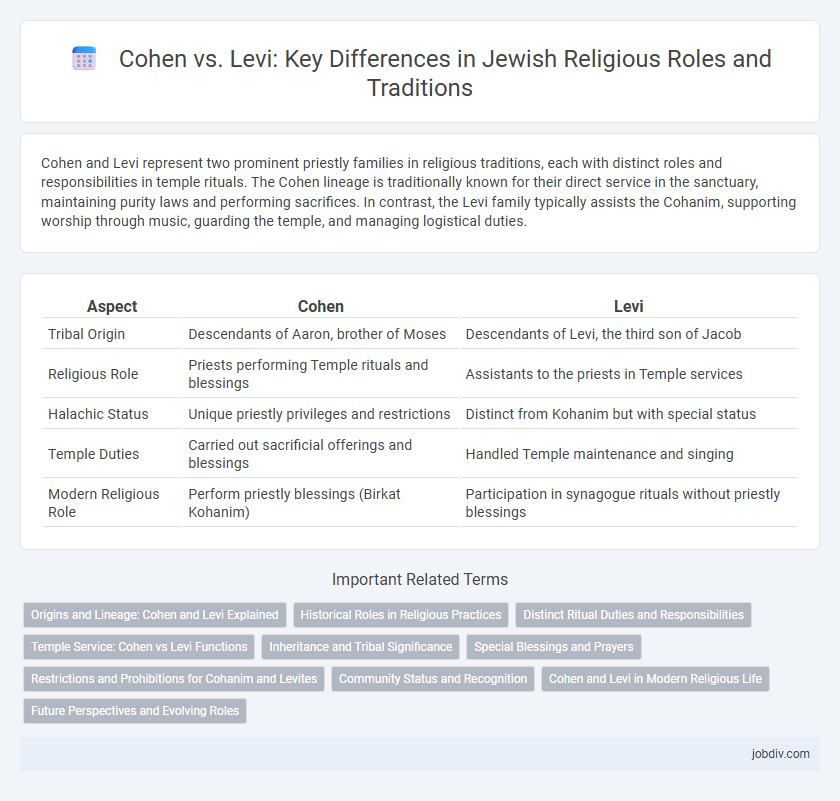Cohen and Levi represent two prominent priestly families in religious traditions, each with distinct roles and responsibilities in temple rituals. The Cohen lineage is traditionally known for their direct service in the sanctuary, maintaining purity laws and performing sacrifices. In contrast, the Levi family typically assists the Cohanim, supporting worship through music, guarding the temple, and managing logistical duties.
Table of Comparison
| Aspect | Cohen | Levi |
|---|---|---|
| Tribal Origin | Descendants of Aaron, brother of Moses | Descendants of Levi, the third son of Jacob |
| Religious Role | Priests performing Temple rituals and blessings | Assistants to the priests in Temple services |
| Halachic Status | Unique priestly privileges and restrictions | Distinct from Kohanim but with special status |
| Temple Duties | Carried out sacrificial offerings and blessings | Handled Temple maintenance and singing |
| Modern Religious Role | Perform priestly blessings (Birkat Kohanim) | Participation in synagogue rituals without priestly blessings |
Origins and Lineage: Cohen and Levi Explained
Cohen and Levi trace their origins to the ancient Israelite priestly classes with distinct religious roles; Cohanim are descendants of Aaron, the first High Priest, while Levites stem from the broader tribe of Levi assigned to temple service. Cohanim held exclusive rights to perform sacred rituals and blessings, maintaining hereditary priesthood lineage, whereas Levites assisted in religious duties such as music and temple maintenance. Both groups' genealogies are meticulously preserved through religious texts and traditions, underscoring their unique spiritual significance in Jewish heritage.
Historical Roles in Religious Practices
Cohen and Levi represent two distinct hereditary roles within Jewish religious practices, with Cohanim serving as priests responsible for Temple rituals and blessings. Levites functioned as assistants to the Cohanim, performing tasks such as guarding the Temple and facilitating musical worship. These roles, rooted in biblical tradition, continue to influence synagogue ceremonies and communal religious life today.
Distinct Ritual Duties and Responsibilities
Cohen priests hold distinctive ritual duties, including performing the sacrificial offerings and blessing the congregation with the Priestly Blessing (Birkat Kohanim), responsibilities exclusive to their hereditary lineage. Levites assist the Kohanim by maintaining the sanctuary, singing in the Temple choir, and performing various service tasks that support the sacrificial system but do not include offering sacrifices themselves. The division of roles highlights a structured hierarchy within ancient Israelite worship, emphasizing the Kohanim's primary priestly functions and the Levites' supportive liturgical roles.
Temple Service: Cohen vs Levi Functions
Cohanim serve as the primary priests performing sacred Temple rituals, including offering sacrifices and conducting the daily services, while Levites assist by maintaining the sanctuary, singing during worship, and supporting the priests in their duties. The distinct roles of Cohanim emphasize ritual purity and direct engagement with the altar, whereas Levites handle musical and logistical aspects of Temple service. This division of labor reflects ancient Israelite religious hierarchy, underscoring the unique priestly status of Cohanim compared to the supportive functions of the Levites.
Inheritance and Tribal Significance
Cohen and Levi hold distinct inheritance rights rooted in their tribal roles within Judaism, where Cohanim receive specific priestly privileges and inherit sanctified responsibilities linked to the Temple service. Leviim, while also part of the tribe of Levi, do not inherit the priesthood but instead are allocated roles in religious duties and Temple maintenance, with inheritance typically excluding land but including designated cities. These differences underscore the tribal significance, as Cohanim inherit sacred status and associated offerings, highlighting a structured system of religious leadership and inheritance within Israelite tradition.
Special Blessings and Prayers
Special blessings and prayers distinctively differentiate Cohen from Levi roles within Jewish tradition, with Cohanim holding unique priestly privileges including the Birkat Kohanim (Priestly Blessing) performed during synagogue services. Levites assist Cohanim, often leading in certain liturgical functions and Temple rituals historically, but do not perform the Birkat Kohanim themselves. These roles underscore their specific religious duties and spiritual responsibilities, shaping communal worship and individual blessings in Jewish religious practice.
Restrictions and Prohibitions for Cohanim and Levites
Cohanim and Levites face specific religious restrictions and prohibitions derived from Torah law, including limitations on marriage, ritual purity, and participation in certain Temple services. Cohanim, as descendants of Aaron, are prohibited from marrying divorcees or women with questionable lineage and must avoid contact with the dead, except close relatives, to maintain ritual purity. Levites have fewer restrictions but are also restricted from certain impurity issues and have specific roles during Temple rites and synagogue rituals that exclude them from regular secular occupations.
Community Status and Recognition
In religious communities, Cohen status signifies a hereditary priestly lineage with distinct ritual roles and privileges, whereas Levi status denotes descent from the tribe of Levi, primarily responsible for temple service and assisting Cohenim. Recognition of a person's status affects their participation in synagogue honors, religious ceremonies, and communal leadership. Community acceptance of Cohen or Levi lineage relies on documented genealogies, oral traditions, or rabbinic endorsements to maintain authentic tribal distinctions.
Cohen and Levi in Modern Religious Life
Cohen and Levi hold distinct roles in modern religious life, particularly within Judaism, where Cohanim (priests) are direct descendants of Aaron and perform sacred rituals during synagogue services. Levis, members of the tribe of Levi but not descendants of Aaron, support religious ceremonies through responsibilities such as Torah reading and synagogue maintenance. Their roles preserve ancient traditions while adapting to contemporary spiritual practices and community leadership.
Future Perspectives and Evolving Roles
Cohen and Levi represent evolving roles in religious leadership, adapting to contemporary challenges while preserving traditional values. Future perspectives emphasize their increasing engagement with interfaith dialogue and community outreach, fostering inclusivity and spiritual growth. Technological advancements and shifting societal norms continue to reshape their responsibilities, enhancing their influence within modern religious practice.
Cohen vs Levi Infographic

 jobdiv.com
jobdiv.com